22 start with W start with W
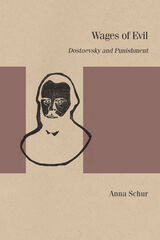
As Dostoevsky attempts to balance the various ethical and cultural imperatives, he displays ambivalence both about punishment and about mercy. This ambivalence, Schur argues, is further complicated by what Dostoevsky sees as the unfathomable quality of the self, which hinders every attempt to match crimes with punishments. The one certainty he holds is that a proper response to wrongdoing must include a concern for the wrongdoer’s moral improvement.
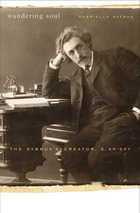
The man who would become S. An-sky—ethnographer, war correspondent, author of the best-known Yiddish play, The Dybbuk—was born Shloyme-Zanvl Rapoport in 1863, in Russia’s Pale of Settlement. His journey from the streets of Vitebsk to the center of modern Yiddish and Hebrew theater, by way of St. Petersburg, Paris, and war-torn Austria-Hungry, was both extraordinary and in some ways typical: Marc Chagall, another child of Vitebsk, would make a similar transit a generation later. Like Chagall, An-sky was loyal to multiple, conflicting Jewish, Russian, and European identities. And like Chagall, An-sky made his physical and cultural transience manifest as he drew on Jewish folk culture to create art that defied nationality.
Leaving Vitebsk at seventeen, An-sky forged a number of apparently contradictory paths. A witness to peasant poverty, pogroms, and war, he tried to rescue the vestiges of disappearing communities even while fighting for reform. A loner addicted to reinventing himself—at times a Russian laborer, a radical orator, a Jewish activist, an ethnographer of Hasidism, a wartime relief worker—An-sky saw himself as a savior of the people’s culture and its artifacts. What united the disparate strands of his life was his eagerness to speak to and for as many people as possible, regardless of their language or national origin.
In this first full-length biography in English, Gabriella Safran, using Russian, Yiddish, Hebrew, and French sources, recreates this neglected protean figure who, with his passions, struggles, and art, anticipated the complicated identities of the European Jews who would follow him.
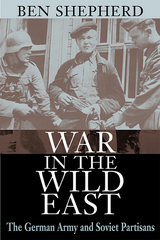
In Nazi eyes, the Soviet Union was the “wild east,” a savage region ripe for exploitation, its subhuman inhabitants destined for extermination or helotry. An especially brutal dimension of the German army’s eastern war was its anti-partisan campaign. This conflict brought death and destruction to thousands of Soviet civilians, and has been held as a prime example of ordinary German soldiers participating in the Nazi regime’s annihilation policies.
Ben Shepherd enters the heated debate over the wartime behavior of the Wehrmacht in a detailed study of the motivation and conduct of its anti-partisan campaign in the Soviet Union. He investigates how anti-partisan warfare was conducted, not by the generals, but by the far more numerous, average Germans serving as officers in the field. What shaped their behavior was more complex than Nazi ideology alone. The influence of German society, as well as of party and army, together with officers’ grueling yet diverse experience of their environment and enemy, made them perceive the anti-partisan war in varied ways. Reactions ranged from extreme brutality to relative restraint; some sought less to terrorize the native population than to try to win it over. The emerging picture does not dilute the suffering the Wehrmacht’s eastern war inflicted. It shows, however, that properly judging ordinary Germans’ role in that war is more complicated than is indicated by either wholesale condemnation or wholesale exoneration.
This valuable study offers a nuanced discussion of the diversity of behaviors within the German army, as well as providing a compelling exploration of the war and counterinsurgency operations on the eastern front.
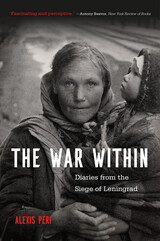
Winner of the Pushkin House Russian Book Prize
Winner of the University of Southern California Book Prize
Honorable Mention, Reginald Zelnik Book Prize
“Fascinating and perceptive.”
—Antony Beevor, New York Review of Books
“Stand aside, Homer. I doubt whether even the author of the Iliad could have matched Alexis Peri’s account of the 872-day siege which Leningrad endured.”
—Jonathan Mirsky, The Spectator
“Powerful and illuminating…A fascinating, insightful, and nuanced work.”
—Anna Reid, Times Literary Supplement
“Much has been written about Leningrad’s heroic resistance. But the remarkable aspect of [Peri’s] book is that she tells a very different story: recounting the internal struggles of ordinary people desperately trying to survive and make sense of their fate.”
—John Thornhill, Financial Times
“A sensitive, at times almost poetic examination of their emotions and disordered mental states. It both contrasts with and complements the equally accurate official Soviet portrait of a stalwart population standing firm in the face of evil and in defense of Soviet ideals.”
—Robert Legvold, Foreign Affairs
In September 1941, two and a half months after the Nazis invaded the Soviet Union, the German Wehrmacht encircled Leningrad. Cut off from the rest of Russia, the city remained blockaded for 872 days, at a cost of almost a million lives. It was one of the longest and deadliest sieges in modern history.
The War Within chronicles the Leningrad blockade from the perspective of those who endured it. Drawing on unpublished diaries, Alexis Peri tells the tragic story of how young and old struggled to make sense of a world collapsing around them. When the blockade was lifted in 1944, Kremlin officials censored publications describing the ordeal and arrested many of Leningrad’s wartime leaders. Some were executed. Diaries—now dangerous to their authors—were concealed, shelved in archives, and forgotten. The War Within recovers these lost accounts, shedding light on one of World War II’s darkest episodes while paying tribute the resilience of the human spirit.
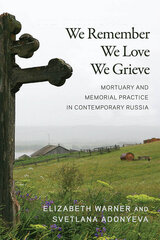
“We remember, we love, we grieve” is a common epitaph in this part of the world. As contemporary Russia contends with the Soviet Union’s legacy of dismantling older ways of life, the phrase ripples beyond individual loss—it encapsulates communities’ determination to preserve their customs when faced with oppression. This volume offers insight into a core cultural practice, exploring the dynamism of tradition.
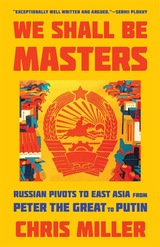
An illuminating account of Russia’s attempts—and failures—to achieve great power status in Asia.
Since Peter the Great, Russian leaders have been lured by opportunity to the East. Under the tsars, Russians colonized Alaska, California, and Hawaii. The Trans-Siberian Railway linked Moscow to Vladivostok. And Stalin looked to Asia as a sphere of influence, hospitable to the spread of Soviet Communism. In Asia and the Pacific lay territory, markets, security, and glory.
But all these expansionist dreams amounted to little. In We Shall Be Masters, Chris Miller explores why, arguing that Russia’s ambitions have repeatedly outstripped its capacity. With the core of the nation concentrated thousands of miles away in the European borderlands, Russia’s would-be pioneers have always struggled to project power into Asia and to maintain public and elite interest in their far-flung pursuits. Even when the wider population professed faith in Asia’s promise, few Russians were willing to pay the steep price. Among leaders, too, dreams of empire have always been tempered by fears of cost. Most of Russia’s pivots to Asia have therefore been halfhearted and fleeting.
Today the Kremlin talks up the importance of “strategic partnership” with Xi Jinping’s China, and Vladimir Putin’s government is at pains to emphasize Russian activities across Eurasia. But while distance is covered with relative ease in the age of air travel and digital communication, the East remains far off in the ways that matter most. Miller finds that Russia’s Asian dreams are still restrained by the country’s firm rooting in Europe.

“Miller’s terrific book reminds that Russia made moves toward the East five hundred years ago, and explains why ignoring the Russian factor in Asian geopolitics today would be a big mistake.”
—Michael McFaul, author of From Cold War to Hot Peace
“Miller presents a Russia little known in the West: a Eurasian power that treats its eastern calling as seriously as it does its western one. Exceptionally well written and argued, We Shall Be Masters helps us understand Russia on its own terms and offers historical insight into the future of its relations with China, its main rival and occasional ally.”
—Serhii Plokhy, author of The Gates of Europe
“Challenges the conventional view that [Russia] has enduring interests in the Far East…For Russia, Miller argues, Asia has been a land of unfulfilled promises.”
—Foreign Affairs
“Captures the immensity, complexity, and importance of Russia’s eastern borderlands through the eyes of its explorers…Comprehensive and fluidly written.”
—Publishers Weekly
Ever since Peter the Great, Russian leaders have been lured by the promise of the East. But from the tsars to Stalin and beyond, Russia’s ambitions have repeatedly outstripped its capacity. In We Shall Be Masters, Chris Miller explores why these expansionist dreams so often ended in disappointment. With the heart of the nation in the European borderlands, Russia’s would-be pioneers struggled to maintain public interest in their far-flung pursuits. But its leaders never stopped setting their sights on the riches of the East. Today, as Vladimir Putin seeks to cement his strategic partnership with Xi Jinping’s China, the East remains as elusive and attractive to Russia as ever—and is likely to be as unattainable.
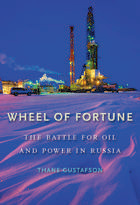
A Foreign Affairs Best Book of the Year on Eastern Europe and the Former Soviet Republics
The Russian oil industry—which vies with Saudi Arabia as the world’s largest producer and exporter of oil, providing nearly 12 percent of the global supply—is facing mounting problems that could send shock waves through the Russian economy and worldwide. Wheel of Fortune provides an authoritative account of this vital industry from the last years of communism to its uncertain future. Tracking the interdependence among Russia’s oil industry, politics, and economy, Thane Gustafson shows how the stakes extend beyond international energy security to include the potential threat of a destabilized Russia.
“Few have studied the Russian oil and gas industry longer or with a broader political perspective than Gustafson. The result is this superb book, which is not merely a fascinating, subtle history of the industry since the Soviet Union’s collapse but also the single most revealing work on Russian politics and economics published in the last several years.”
—Robert Legvold, Foreign Affairs
“The history of Russia’s oil industry since the collapse of communism is the history of the country itself. There can be few better guides to this terrain than Thane Gustafson.”
—Neil Buckley, Financial Times
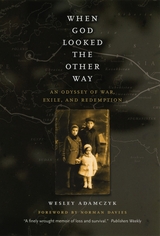
Adamczyk was a young Polish boy when he was deported with his mother and siblings from their comfortable home in Luck to Soviet Siberia in May of 1940. His father, a Polish Army officer, was taken prisoner by the Red Army and eventually became one of the victims of the Katyn massacre, in which tens of thousands of Polish officers were slain at the hands of the Soviet secret police. The family's separation and deportation in 1940 marked the beginning of a ten-year odyssey in which the family endured fierce living conditions, meager food rations, chronic displacement, and rampant disease, first in the Soviet Union and then in Iran, where Adamczyk's mother succumbed to exhaustion after mounting a harrowing escape from the Soviets. Wandering from country to country and living in refugee camps and the homes of strangers, Adamczyk struggled to survive and maintain his dignity amid the horrors of war.
When God Looked the Other Way is a memoir of a boyhood lived in unspeakable circumstances, a book that not only illuminates one of the darkest periods of European history but also traces the loss of innocence and the fight against despair that took root in one young boy. It is also a book that offers a stark picture of the unforgiving nature of Communism and its champions. Unflinching and poignant, When God Looked the Other Way will stand as a testament to the trials of a family during wartime and an intimate chronicle of episodes yet to receive their historical due.
“A finely wrought memoir of loss and survival.”—Publishers Weekly
“Adamczyk’s unpretentious prose is well-suited to capture that truly awful reality.” —Andrew Wachtel, Chicago Tribune Books
“Mr. Adamczyk writes heartfelt, straightforward prose. . . . This book sheds light on more than one forgotten episode of history.”—Gordon Haber, New York Sun
“One of the most remarkable World War II sagas I have ever read. It is history with a human face.”—Andrew Beichman, Washington Times
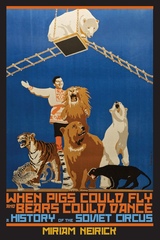
For more than seven decades the circuses enjoyed tremendous popularity in the Soviet Union. How did the circus—an institution that dethroned figures of authority and refused any orderly narrative structure—become such a cultural mainstay in a state known for blunt and didactic messages? Miriam Neirick argues that the variety, flexibility, and indeterminacy of the modern circus accounted for its appeal not only to diverse viewers but also to the Soviet state. In a society where government-legitimating myths underwent periodic revision, the circus proved a supple medium of communication.
Between 1919 and 1991, it variously displayed the triumph of the Bolshevik revolution, the beauty of the new Soviet man and woman, the vulnerability of the enemy during World War II, the prosperity of the postwar Soviet household, and the Soviet mission of international peace—all while entertaining the public with the acrobats, elephants, and clowns. With its unique ability to meet and reconcile the demands of both state and society, the Soviet circus became the unlikely darling of Soviet culture and an entertainment whose usefulness and popularity stemmed from its ambiguity.
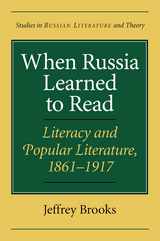
With a new introduction that underscores its relevance to a post-Soviet Russia, When Russia Learned to Read addresses the question of Russia's common heritage with the liberal democratic market societies of Western Europe and the United States. This prize-winning book also exposes the unsuspected complexities of a mass culture little known and less understood in the West. Jeffrey Brooks brings out the characteristically Russian aspect of the nation's popular writing as he ranges through chapbooks, detective stories, newspaper serials, and women's fiction, tracing the emergence of secular, rational, and cosmopolitan values along with newly minted notions of individual initiative and talent. He shows how crude popular tales and serials of the era find their echoes in the literary themes of Dostoevsky, Tolstoy, and other great Russian writers, as well as in the current renaissance of Russian detective stories and thrillers.
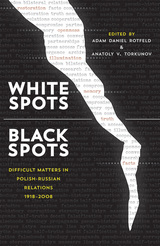
This pioneering study, prepared by the semi-official Polish-Russian Group on Difficult Matters, is a comprehensive effort to document and fully disclose the major conflicts and interrelations between the two nations from 1918 to 2008, events that have often been avoided or presented with a strong political bias. This is the English translation of this major study, which has received acclaim for its Polish and Russian editions.
The chapters offer parallel histories by prominent Polish and Russian scholars who recount each country’s version of the event in question. Among the topics discussed are the 1920 Polish-Russian war, the origins of World War II and the notorious Hitler-Stalin pact, the infamously shrouded Katyn massacre, the communization of Poland, Cold War relations, the Solidarity movement and martial law, and the renewed relations of contemporary Poland and Russia.

In the final months of World War I, President Woodrow Wilson and many US allies decided to intervene in Siberia in order to protect Allied wartime and business interests, among them the Trans-Siberian Railroad, from the turmoil surrounding the Russian Revolution. American troops would remain until April 1920 with some of our allies keeping troops in Siberia even longer.
Few American citizens have any idea that the United States ever deployed soldiers to Siberia and that those soldiers eventually played a role in the Russian revolution while protecting the Trans-Siberian Railroad. Wolfhounds and Polar Bears relies on the detailed reports of the American Expeditionary Force (AEF) as well as on personal stories to bring this rarely discussed expedition to life.
Initial chapters recount the period in World War I when conditions in Russia pointed to the need for intervention as well as the varied reasons for that decision. A description of the military forces and the geographic difficulties faced by those forces operating in Siberia provide the baseline necessary to understand the AEF’s actions in Siberia. A short discussion of the Russian Railway Service Corps explains their essential and sometimes overlooked role in this story, and subsequent chapters provide a description of actual operations by the AEF.
Wolfhounds and Polar Bears: The American Expeditionary Force in Siberia, 1918–1920 may well be the most detailed study of the military aspects of the American intervention in Siberia ever undertaken, offering a multitude of details not available in any other book-length history.
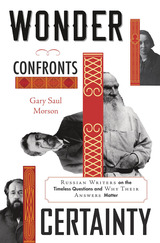
A noted literary scholar traverses the Russian canon, exploring how realists, idealists, and revolutionaries debated good and evil, moral responsibility, and freedom.
Since the age of Tolstoy, Dostoevsky, and Chekhov, Russian literature has posed questions about good and evil, moral responsibility, and human freedom with a clarity and intensity found nowhere else. In this wide-ranging meditation, Gary Saul Morson delineates intellectual debates that have coursed through two centuries of Russian writing, as the greatest thinkers of the empire and then the Soviet Union enchanted readers with their idealism, philosophical insight, and revolutionary fervor.
Morson describes the Russian literary tradition as an argument between a radical intelligentsia that uncompromisingly followed ideology down the paths of revolution and violence, and writers who probed ever more deeply into the human condition. The debate concerned what Russians called “the accursed questions”: If there is no God, are good and evil merely human constructs? Should we look for life’s essence in ordinary or extreme conditions? Are individual minds best understood in terms of an overarching theory or, as Tolstoy thought, by tracing the “tiny alternations of consciousness”? Exploring apologia for bloodshed, Morson adapts Mikhail Bakhtin’s concept of the non-alibi—the idea that one cannot escape or displace responsibility for one’s actions. And, throughout, Morson isolates a characteristic theme of Russian culture: how the aspiration to relieve profound suffering can lead to either heartfelt empathy or bloodthirsty tyranny.
What emerges is a contest between unyielding dogmatism and open-minded dialogue, between heady certainty and a humble sense of wonder at the world’s elusive complexity—a thought-provoking journey into inescapable questions.
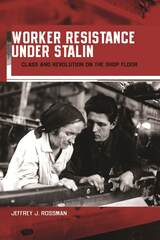
Challenging the claim that workers supported Stalin's revolution "from above" as well as the assumption that working-class opposition to a workers' state was impossible, Jeffrey Rossman shows how a crucial segment of the Soviet population opposed the authorities during the critical industrializing period of the First Five-Year Plan.
Marshaling an impressive range of archival evidence, Rossman recounts in vivid detail myriad individual and collective acts of protest, including mass demonstrations, food riots, strikes, slowdowns, violent attacks against officials, and subversive letters to the authorities. Male and female workers in one of Russia's oldest, largest, and "reddest" manufacturing centers--the textile plants of the Ivanovo Industrial Region--actively resisted Stalinist policies that consigned them to poverty, illness, and hunger.
In April 1932, 20,000 mill workers across the region participated in a wave of strikes. Seeing the event as a rebuke to his leadership, Stalin dispatched Lazar Kaganovich to quash the rebellion, resulting in bloodshed and repression. Moscow was forced to respond to the crisis on the nation's shop floors with a series of important reforms.
Rossman uncovers a new dimension to the relationship between the Soviet leadership and working class and makes an important contribution to the debate about the nature of resistance to the Stalinist regime.
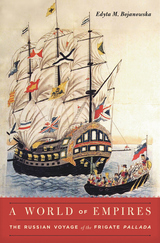
A Financial Times Best History Book of the Year
Many people are familiar with American Commodore Matthew Perry’s expedition to open trade relations with Japan in the early 1850s. Less well known is that on the heels of the Perry squadron followed a Russian expedition secretly on the same mission. Serving as secretary to the naval commander was novelist Ivan Goncharov, who turned his impressions into a book, The Frigate Pallada, which became a bestseller in imperial Russia. In A World of Empires, Edyta Bojanowska uses Goncharov’s fascinating travelogue as a window onto global imperial history in the mid-nineteenth century.
Reflecting on encounters in southern Africa’s Cape Colony, Dutch Java, Spanish Manila, Japan, and the British ports of Singapore, Hong Kong, and Shanghai, Goncharov offers keen observations on imperial expansion, cooperation, and competition. Britain’s global ascendancy leaves him in equal measures awed and resentful. In Southeast Asia, he recognizes an increasingly interlocking world in the vibrant trading hubs whose networks encircle the globe. Traveling overland back home, Goncharov presents Russia’s colonizing rule in Siberia as a positive imperial model, contrasted with Western ones.
Slow to be integrated into the standard narrative on European imperialism, Russia emerges here as an increasingly assertive empire, eager to position itself on the world stage among its American and European rivals and fully conversant with the ideologies of civilizing mission and race. Goncharov’s gripping narrative offers a unique eyewitness account of empire in action, in which Bojanowska finds both a zeal to emulate European powers and a determination to define Russia against them.
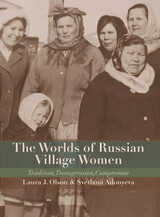
Based upon nearly three decades of fieldwork, from 1983 to 2010, The Worlds of Russian Rural Women follows three generations of Russian women and shows how they alternately preserve, discard, and rework the cultural traditions of their forebears to suit changing needs and self-conceptions. In a major contribution to the study of folklore, Laura J. Olson and Svetlana Adonyeva document the ways that women’s tales of traditional practices associated with marriage, childbirth, and death reflect both upholding and transgression of social norms. Their romance songs, satirical ditties, and healing and harmful magic reveal the complexity of power relations in the Russian villages.
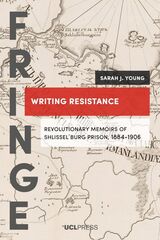
In 1884, sixty-eight prisoners convicted of terrorism and revolutionary activity were transferred to a new maximum-security prison at Shlissel´burg Fortress near St. Petersburg. Inhuman conditions in the prison caused severe mental and physical deterioration among the prisoners, and over half died. However, the survivors fought back to reform the prison and improve the inmates’ living conditions. Their memoirs enshrined their experience in revolutionary mythology and served as an indictment of the Tsarist autocracy’s loss of moral authority. This book features three of these memoirs—translated into English for the first time—as well as an introductory essay that analyzes the memoirs’ construction of a collective narrative of resilience, resistance, and renewal. The first extended study of these memoirs in English, this book uncovers an important episode in the history of political imprisonment. It will be of interest to scholars and students of the Russian revolution, carceral history, penal practice and behaviors, and prison and life writing.
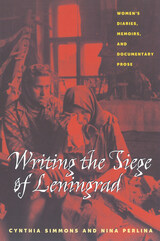
Silver Winner, ForeWord Magazine Book of the Year, History
From September 1941 until January 1944, Leningrad suffered under one of the worst sieges in the history of warfare. At least one million civilians died, many during the terribly cold first winter. Bearing the brunt of this hardship—and keeping the city alive through their daily toil and sacrifice—were the women of Leningrad. Yet their perspective on life during the siege has been little examined.
Cynthia Simmons and Nina Perlina have searched archival holdings for letters and diaries written during the siege, conducted interviews with survivors, and collected poetry, fiction, and retrospective memoirs written by the blokadnitsy (women survivors) to present a truer picture of the city under siege. In simple, direct, even heartbreaking language, these documents tell of lost husbands, mothers, children; meager rations often supplemented with sawdust and other inedible additives; crime, cruelty, and even cannibalism. They also relate unexpected acts of kindness and generosity; attempts to maintain cultural life through musical and dramatic performances; and provide insight into a group of ordinary women reaching beyond differences in socioeconomic class, ethnicity, and profession in order to survive in extraordinary times.

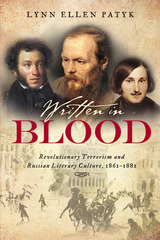
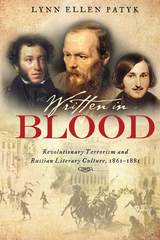
Lynn Ellen Patyk contends that the prototype for the terrorist was the Russian writer, whose seditious word was interpreted as an audacious deed—and a violent assault on autocratic authority. The interplay and interchangeability of word and deed, Patyk argues, laid the semiotic groundwork for the symbolic act of violence at the center of revolutionary terrorism. While demonstrating how literary culture fostered the ethos, pathos, and image of the revolutionary terrorist and terrorism, she spotlights Fyodor Dostoevsky and his "terrorism trilogy"—Crime and Punishment (1866), Demons (1870–73), and The Brothers Karamazov (1878–80)—as novels that uniquely illuminate terrorism's methods and trajectory. Deftly combining riveting historical narrative with penetrating literary analysis of major and minor works, Patyk's groundbreaking book reveals the power of the word to spawn deeds and the power of literature to usher new realities into the world.
READERS
Browse our collection.
PUBLISHERS
See BiblioVault's publisher services.
STUDENT SERVICES
Files for college accessibility offices.
UChicago Accessibility Resources
home | accessibility | search | about | contact us
BiblioVault ® 2001 - 2024
The University of Chicago Press









